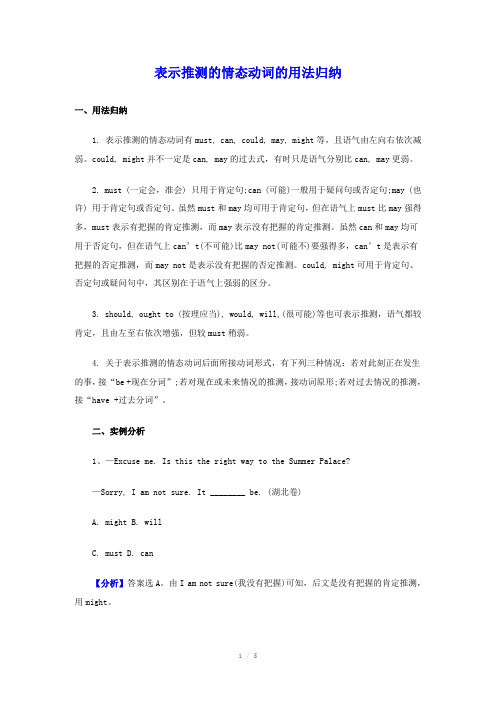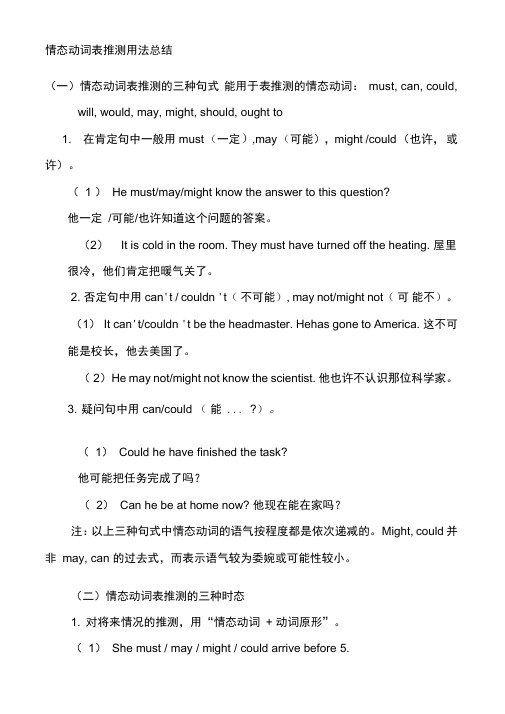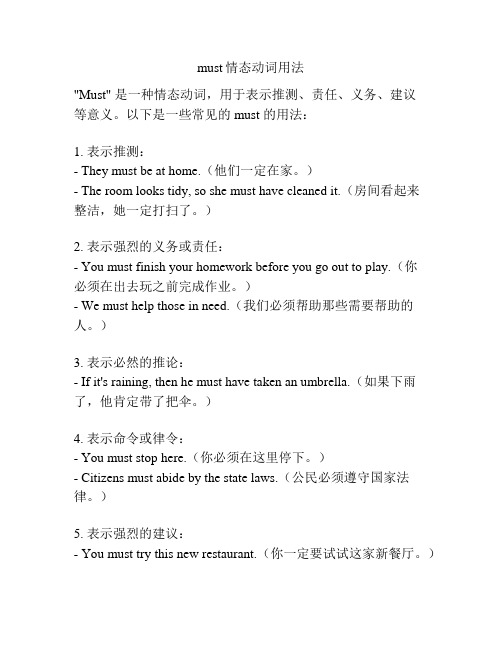表示推测的情态动词有must
情态动词must的用法总结

情态动词must的用法总结Must表示必须的时候,多是指现在或将来的情况,用来强调说话者的主观语气。
同时must也是表示有必要或有义务去做某事;must 表示推测的时候,多指有根据的推测,只能用于肯定句中,可以对现在、过去或者将来的情况进行推测。
扩展资料在英语中,情态动词must一共有两种含义,一种是表示必须;另一种是表示推测。
下面我们来看一下must不同含义时,不同的用法。
一、must表示必须的时候,多是指现在或将来的情况,用来强调说话者的主观语气。
同时must也是表示有必要或有义务去做某事。
对must表示必须时候的一般疑问句,肯定回答是用must;否定的回答是用don’t have to或者needn’t。
比如:You must listen to carefully in the English class.你必须在英语课上仔细听讲。
I must finish it in the night.我必须在晚上完成这件事。
He must to help other finish the homework.他必须帮助其他学生完成作业。
当must表示必须的时候,我们一定要注意区别must与have to。
这两者都可以表示必须。
must是指说说话者的意识,强调的是主观性,而have to是指外界的客观情况,强调的是客观性。
比如:You know you must finish the homerwork tonight.你知道的,你必须在今天晚上完成你的作业。
(强调主观意愿)You have to finish homework when your teacher receive it.当你的老师收作业的'时候,你不得不完成作业。
(强调客观情况)二、must表示推测的时候,多用来指有把握的、有根据的推测。
Must表示推测的时候只能用于肯定句中,可以对现在、过去或者将来的情况进行推测。
比如:The book must be Tom, it has his name on it.这本书一定是汤姆的,上面有他的名字。
表示推测的情态动词的用法归纳

表示推测的情态动词的用法归纳一、用法归纳1. 表示推测的情态动词有must, can, could, may, might等,且语气由左向右依次减弱。
could, might并不一定是can, may的过去式,有时只是语气分别比can, may更弱。
2. must (一定会,准会) 只用于肯定句;can (可能)一般用于疑问句或否定句;may (也许) 用于肯定句或否定句。
虽然must和may均可用于肯定句,但在语气上must比may强得多,must表示有把握的肯定推测,而may表示没有把握的肯定推测。
虽然can和may均可用于否定句,但在语气上can’t(不可能)比may not(可能不)要强得多,can’t是表示有把握的否定推测,而may not是表示没有把握的否定推测。
could, might可用于肯定句、否定句或疑问句中,其区别在于语气上强弱的区分。
3. should, ought to (按理应当), would, will,(很可能)等也可表示推测,语气都较肯定,且由左至右依次增强,但较must稍弱。
4. 关于表示推测的情态动词后面所接动词形式,有下列三种情况:若对此刻正在发生的事,接“be +现在分词”;若对现在或未来情况的推测,接动词原形;若对过去情况的推测,接“have +过去分词”。
二、实例分析1、—Excuse me. Is this the right way to the Summer Palace?—Sorry, I am not sure. It ________ be. (湖北卷)A. mightB. willC. mustD. can【分析】答案选A。
由I am not sure(我没有把握)可知,后文是没有把握的肯定推测,用might。
2、You might just as well tell the manufacturer that male customers ________ not like the design of the furniture. (上海卷)A. mustB. shallC. mayD. need【分析】答案选C。
表“猜测”的情态动词

表“猜测”的情态动词山东省无棣一中马士红251900在英语中,表猜测的情态动词主要有must,may/might,can/could,为了帮助同学们理解和掌握它们的区别和用法,现作如下归纳:一. mustmust表猜测时,语气较强,一般只用于肯定句中,表示对现在或过去发生的事情或情况相当有把握的推论和揣测,通常译为“一定是”“准是”“肯定是”。
1. must+动词原形,表示对目前情况十分肯定的猜测。
(1)The light is on.He must be in the room.灯亮着,他一定在房间里。
(2)You must be in trouble, for you look anxious.你一定遇上了麻烦,你看上去焦虑不安。
2. must+be+ V-ing,表示对目前正在发生着的情况进行有把握的猜测。
(3)You must be writing a composition.你一定正在写一篇作文吧。
3. must+have+过去分词,表示对过去发生的事情或情况十分肯定的猜测。
(4)It must have rained last night, for the ground is very wet.昨晚肯定下过雨,地面很湿。
(5)You know the city so well; You must have lived there for many years.你对这个城市这么了解,你一定在这里生活了很多年。
4. 反意疑问句。
must表猜测时,其反意疑问句比较灵活多变,以上例句的反意疑问句分别为:①isn't he?②aren't you?③aren't you?④didn't it?(5)haven't you?二. may/mightmay/might表猜测时一般用于肯定句或否定句,不用于疑问句。
表示对现在或过去的事情或情况作出不太肯定的揣测,语气比must,can/could弱,常译为“也许”“可能”“大概”,may/might not译为“可能不”。
情态动词表推测用法总结

情态动词表推测用法总结(一)情态动词表推测的三种句式能用于表推测的情态动词:must, can, could, will, would, may, might, should, ought to1. 在肯定句中一般用must (一定),may (可能),might /could (也许,或许)。
( 1 )He must/may/might know the answer to this question?他一定/可能/也许知道这个问题的答案。
(2)It is cold in the room. They must have turned off the heating. 屋里很冷,他们肯定把暖气关了。
2. 否定句中用can't / couldn 't(不可能), may not/might not(可能不)。
(1)It can't/couldn 't be the headmaster. Hehas gone to America. 这不可能是校长,他去美国了。
(2)He may not/might not know the scientist. 他也许不认识那位科学家。
3. 疑问句中用can/could (能 ... ?)。
(1)Could he have finished the task?他可能把任务完成了吗?(2)Can he be at home now? 他现在能在家吗?注:以上三种句式中情态动词的语气按程度都是依次递减的。
Might, could 并非may, can 的过去式,而表示语气较为委婉或可能性较小。
(二)情态动词表推测的三种时态1. 对将来情况的推测,用“情态动词+ 动词原形”。
(1)She must / may / might / could arrive before 5.5:00 前她一定/ 可能/ 也许到。
(2)She must/may/might/could walk miles and miles amongthe hills without meeting anyone.她一定/ 可能/ 也许会在山里一连走好几英里而遇不到一个人。
must情态动词用法

must情态动词用法"Must" 是一种情态动词,用于表示推测、责任、义务、建议等意义。
以下是一些常见的 must 的用法:1. 表示推测:- They must be at home.(他们一定在家。
)- The room looks tidy, so she must have cleaned it.(房间看起来整洁,她一定打扫了。
)2. 表示强烈的义务或责任:- You must finish your homework before you go out to play.(你必须在出去玩之前完成作业。
)- We must help those in need.(我们必须帮助那些需要帮助的人。
)3. 表示必然的推论:- If it's raining, then he must have taken an umbrella.(如果下雨了,他肯定带了把伞。
)4. 表示命令或律令:- You must stop here.(你必须在这里停下。
)- Citizens must abide by the state laws.(公民必须遵守国家法律。
)5. 表示强烈的建议:- You must try this new restaurant.(你一定要试试这家新餐厅。
)需要注意的是,must 在疑问句和否定句中使用上有一些限制,通常用 "have to" 来代替:- Do you have to go to the meeting?(你必须去开会吗?)- She doesn't have to work on Sundays.(她不必在星期天工作。
)。
情态动词:must表示推测_英语语法词汇

1) must用在肯定句中表示较有把握的推测,意为"一定"。
2) must表对现在的状态或现在正发生的事情的推测时, must 后面通常接系动词be 的原形或行为动词的进行式。
you have worked hard all day.you must be tired. 你辛苦干一整天,一定累了。
(对现在情况的推测判断)
he must be working in his office. 他一定在办公室工作呢。
比较:
he must be staying there.
他现在肯定呆在那里。
he must stay there.
他必须呆在那。
3) must 表示对已发生的事情的推测时,must 要接完成式。
i didn't hear the phone. i must have been asleep. 我刚才没有听到电话,我想必是睡着了。
4) must表示对过去某时正发生的事情的推测,must 后面要接不定式的完成进行式。
---why didn't you answer my phone call?
---well, i must have been sleeping, so i didn't hear it.
5) 否定推测用can't。
if tom didn't leave here until five o'clock, he can't be home yet. 如果汤姆五点才离开这儿,他此时一定还未到家。
情态动词(英语语法)
情态动词(一)情态动词表示推测的情态动词有must,will ,would ,should ,ought to ,can ,could ,may ,might它们在表示推测的语气由强到弱。
1、must表示“应该、必须”的含义时语气比should强烈,在使用时要特别注意以下两个方面:①在回答must表示猜测的问句时,否定回答常用can’t或couldn’t②在回答must表示“必须”的问句时,否定句回答常用needn’t或don’t haveto2、will/would可用于表示预想或猜想。
此外,在表示有规律的“注定会”时,也用will表示3、should用于表示推测时意为“可能、会”。
除表示推测外,should可用于第一人称,表示说话人的一种谦逊、客气的语气。
4、ought to在表示推测时,意为“想必”另外ought to在表示职责、义务时和should有细微差别:should多表达个人的主观看法;ought to则反映客观情况。
5、can/could在表示推测时,常表示客观的可能性。
此外,can和could还可以表示说话者惊讶、怀疑或不相信的态度。
该用法主要用在否定句、疑问句和感叹句中。
另外在实际使用时要注意can’t即可表示“不可能”是针对must的回答;也可意为“不能够”主要针对can的回答。
6、may/might除了表示推测外,may可用于祈使句中表示祝愿;另外,在may提问的疑问句的否定回答中,要用mustn’t(二)、情态动词+have+过去分词的用法1、“must+have+过去分词”表示对过去的一种肯定的推测,意为“肯定,一定”2、“may/might+have+过去分词”表示对已经发生的事情的推测,意为“可能、大概”3、“should/ought to+have+过去分词”用于肯定句时,表示过去没有发生但却应该发生的事情;用于否定句时,表示过去发生过了本不应该发生的事情。
4、“can(not)+have+过去分词”表示对过去(不)可能发生的事情的推测,多用于否定句和疑问句中。
情态动词表示推测
must have done (表肯定性推测) “肯定,准是,” can’t /couldn’t have done (表否定性推测)“不可能” It must have rained last night,for the road is wet.(It can’t/couldn’t have rained last night.)
Ten passangers were in a car!It can’t have been a comfortable jurnery.
(可能性大)
4.He may have gone to Beijing yesterday.
(可能性小)
5He might have gone to Beijing yesterday.
01
There was plenty of time.She needn’t have hurried.
02
You shoulห้องสมุดไป่ตู้ have come to the meeting.
--- He must be Mr. Li.(肯定是)
--No,he can’t be Mr. Li. Mr.Li has
gone to Britain.(不可能是)
We may be late for class.It’s already seven to five.(也许)
You mustn’t play with fire!
另外,在虚拟语气中还有:
02
would have done… 表示“本来会…..”
但实际上并没有发生
情态动词表示推测的用法
1.对现在(事情)推测
2.对过去(事情)推测
表“猜测”的情态动词
表“猜测”的情态动词山东省无棣一中马士红251900在英语中,表猜测的情态动词主要有must,may/might,can/could,为了帮助同学们理解和掌握它们的区别和用法,现作如下归纳:一. mustmust表猜测时,语气较强,一般只用于肯定句中,表示对现在或过去发生的事情或情况相当有把握的推论和揣测,通常译为“一定是”“准是”“肯定是”。
1. must+动词原形,表示对目前情况十分肯定的猜测。
(1)The light is on.He must be in the room.灯亮着,他一定在房间里。
(2)Y ou must be in trouble, for you look anxious.你一定遇上了麻烦,你看上去焦虑不安。
2. must+be+ V-ing,表示对目前正在发生着的情况进行有把握的猜测。
(3)Y ou must be writing a composition.你一定正在写一篇作文吧。
3. must+have+过去分词,表示对过去发生的事情或情况十分肯定的猜测。
(4)It must have rained last night, for the ground is very wet.昨晚肯定下过雨,地面很湿。
(5)Y ou know the city so well; Y ou must have lived there for many years.你对这个城市这么了解,你一定在这里生活了很多年。
4. 反意疑问句。
must表猜测时,其反意疑问句比较灵活多变,以上例句的反意疑问句分别为:①isn't he?②aren't you?③aren't you?④didn't it?(5)haven't you?二. may/mightmay/might表猜测时一般用于肯定句或否定句,不用于疑问句。
表示对现在或过去的事情或情况作出不太肯定的揣测,语气比must,can/could弱,常译为“也许”“可能”“大概”,may/might not译为“可能不”。
表推测的情态动词
二.“情态动词+have done” 的用法。 1.must have done “过去一定做了某事” 表示对过去的一种肯定性推测。 eg. She must have gone by bus. It must have rained last night, for the road is quite muddy.
表示推测的情态动词
一. 表推测的情态动词有: 肯定的推测一般用must,should/ought to, may/might或could(不用can) 1.must的语气最强,译为“肯定, 准 是,想必是”;(mustn’t 表示禁止) 2.should/ought to 的语气次之,译为 “很可能, 应该”,指按常理推测; 3.may/might,could的语气最弱,译为 “也许,可能”。 4.can’t /couldn’t 表示否定推测, ‘‘不可
eg. You have been working hard all
Hale Waihona Puke day ,you must be tired. He must be working in the office now. He should come here today. Can this be done by him? She may be still waiting for us. This may not be done by him. This can not be done by him.
2. can/could have+done“过去可能 做了某事”, “could have+done”也可表示‘‘过 去本可以做某事但实际上却没有做” eg. He was not at home last night, he could have gone to the cinema. I could have finished my homework last night, but I was too sleepy.
- 1、下载文档前请自行甄别文档内容的完整性,平台不提供额外的编辑、内容补充、找答案等附加服务。
- 2、"仅部分预览"的文档,不可在线预览部分如存在完整性等问题,可反馈申请退款(可完整预览的文档不适用该条件!)。
- 3、如文档侵犯您的权益,请联系客服反馈,我们会尽快为您处理(人工客服工作时间:9:00-18:30)。
表示推测的情态动词有must, could, may, might, can, should等。
“情态动词+不定式一般式” 表示对现在或将来的推测,“情态动词+不定式进行式”表示对正在进行的动作或事情的推测,“情态动词+不定式完成式”表示对过去的推测。
一、must表示推测的用法
must表示推测时,只用于肯定句,表示很大的可能性,意为“一定,准是,必然会”。
其否定形式是 can’t/couldn’t (不可能)。
例如:
1. You haven’t eaten anything since this morning; you must be hungry.
2. That can’t be Mary — she’s in hospital.
二、can/could表示推测的用法
1. can表示推测时,多用于肯定句和疑问句。
当用于肯定句时,指“有时可能会”,是理论上的可能,其时间意义宽泛不具体。
例如:
Even experienced teachers can make mistakes.
2. could表示推测时,既可以用于肯定句,又可以用于疑问句。
例如:My book has disappeared. Who could have taken it?
3. can’t/couldn’t表示推测时,用于否定句,是语气最强的否定推测,意为“不可能,一定不(是)”。
例如:
He can’t/couldn’t have seen her there.
4. can/could在疑问句中表示推测时,含有怀疑或疑问的意味,could比can更不确定。
例如:
① Can the news be true?
② Who can it be?
三、may / might表示推测的用法
1. may / might表示推测时,用于肯定句,表示无把握的推测,意为“可能,或许”。
(might 比may 更加不肯定,更无把握)。
例如:
① He may/might be writing a letter now.
② They may have been discussing the problem this morning.
2. may not/ might not表示推测时,用于否定句,表示(无把握的)否定推测,意为“可能/或许不”。
例如:
He looks very happy. He might not have known the result.
四、should表示推测的用法
should表示推测时,表示按常规、常理的推测,即“(正常情况下)按理应该”,暗含很大的可能性,但语气比must弱。
例如:
1. It’s nearly seven o’clock. Jack should be here at any moment.
2. Three weeks should be enough.
【即学即练】
一、用表示推测的情态动词must, could, may, might, can, should的适当形式填空。
1. — Hi, Tom. Any idea where Jane is?
— She be in the classroom. I saw her there just now.
2. — I hear they went skiing in the mountains last winter.
— It be true because there was little snow there.
3. Accidents happen on such rainy days.
4. — How’s your tour around the Noah Lake? Is it beautiful?
— It be, but it is heavily polluted now.
5. He (complete) his work; otherwise, he wouldn’t be enjoying himself by the seaside.
key:1. must 2. couldn’t 3. can 4. should 5. must have completed
二、翻译下列句子,注意情态动词的推测用法和情态动词后动词的形式。
1. 如果火车准点的话,他们应该到北京了。
2. —站在那里的那个人一定是布朗先生。
—不可能是他,他去纽约了。
3. 他们会把房门钥匙藏到哪儿去呢?
4. 他还没来。
你一定忘了通知他开会的时间了。
Key:
1. If the train arrives on time, they should be in Beijing now.
2. — That person standing there must be Mr Brown.
— It can’t be him, because he has gone to New York.
3. Where could they have hidden the key to the room?
4. He hasn’t come yet. You must have forgotten to inform him of the date of the meeting.。
